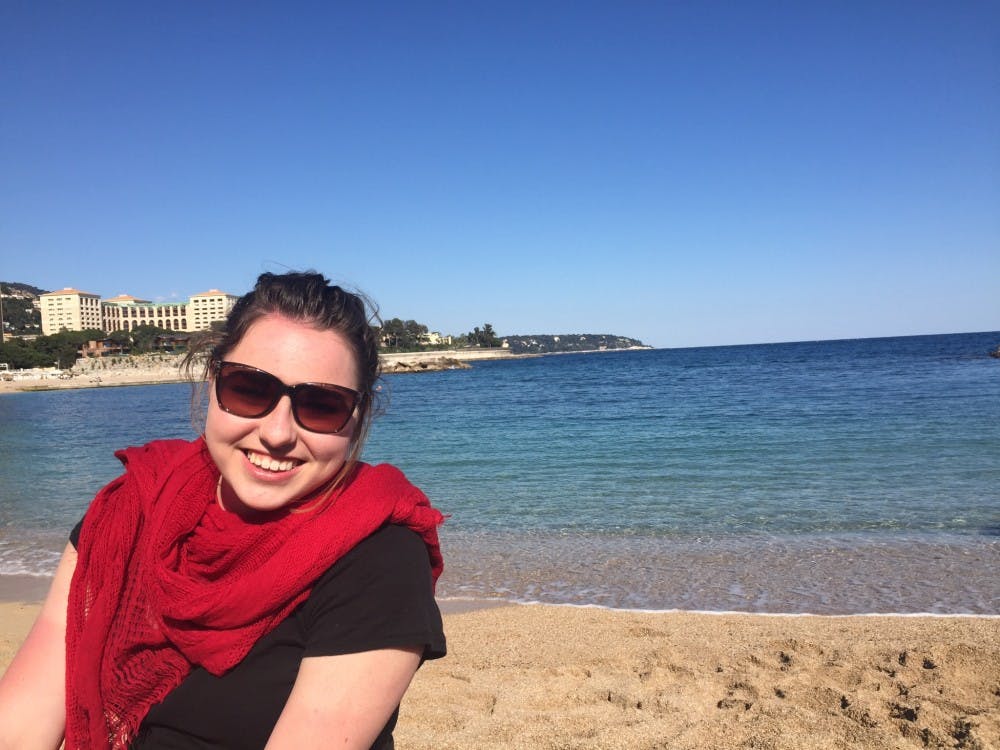On a fall day in Lausanne, Switzerland, Jackie Sirc, WC '17, was out shopping in search of an old-fashioned dress for a Titanic-themed event when she noticed groups of people flowing up a hill chanting, carrying signs and passing out flyers.
Curious, Sirc decided to take a flyer—marking the beginning of her journey as a Fulbright Scholar applicant.
Sirc learned that the people were peacefully protesting an immigration law which stated that illegal refugees and immigrants must be deported if found, often without being considered for asylum or citizenship.
“Swiss society is really homogenous, and recently they have had a lot of trouble integrating Muslim populations into their society,” Sirc said. “I started researching a little more about immigration and citizenship in Switzerland and I got really interested in it.”
Less than a year later, Sirc drafted a research proposal for a Fulbright Research Grant at the University of Switzerland, a competitive grant rewarded to students to conduct their own research at an international university with the help of a faculty adviser.
Each country is allotted a certain number of grants. Switzerland awards on average 11 students out of the 50-60 that typically apply. Sirc made it to the semi-finalist round and has recently been labeled an alternate, meaning she could still be awarded the grant if more funding becomes available or a current winner decides not to accept their grant.
Sirc’s research proposal explores the integration of different cultures in Switzerland, with a case study that would examine the difference between inclusion in rural versus urban areas. She also wants to study what organizations are doing to ease cultural tensions.
Sirc said working with the Office of International Education (OIE) and her experience studying abroad has fueled her ability and desire to get this far.
“I was so hesitant to apply for it because I knew there were so many other great applicants, and Switzerland is particularly difficult for undergrads because most of their programs prefer Masters students,” Sirc said.
While abroad, Sirc made an important connection with a professor at the University of Lausanne, who referred her to a professor in the University of Geneva’s Citizenship Studies department. The professor in Geneva wrote her a letter of affiliation endorsing her research proposal, which is important to acquire for the Fulbright process.
Studying abroad looks good on an application, Anthony Russell, associate dean of international education, said.
“They want applicants who are interested in cultural exchange, who are curious about the world, who are open to other cultures, who embrace that kind of global perspective,”Russell said.
Enjoy what you're reading?
Signup for our newsletter
Sirc has also studied abroad in France, Scotland and Indonesia.
To help students apply to be a Fulbright Scholar, the OIE organized a series of workshops and information sessions to get students interested in the spring. The summer before the application is due, students meet with an adviser to guide them. The OIE sets an internal deadline about a month before the Fulbright deadline in October, so a faculty committee can meet with students and advise them on how to improve their proposals.
Patrick Schweiger, the on-campus Fulbright adviser, helps students with their applications and puts together a network of support for the students.
“We like to talk of it in terms of building a Fulbright culture on campus. Jackie is a good example of a student who has gone through the application, and now she is encouraging other students to go through it,” Schweiger said.
Sirc will hear from the Fulbright committee in Switzerland by the end of May, regarding their decision.
“I thought it was a great project, timely in terms of what’s happening in the world,” Russell said. “In particular, it was good because it was ambitious in the problems it was trying to address, but very specific in its focus.”
Contact features writer Stephanie Hagan at stephanie.hagan@richmond.edu.
Support independent student media
You can make a tax-deductible donation by clicking the button below, which takes you to our secure PayPal account. The page is set up to receive contributions in whatever amount you designate. We look forward to using the money we raise to further our mission of providing honest and accurate information to students, faculty, staff, alumni and others in the general public.
Donate Now



